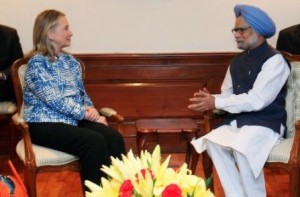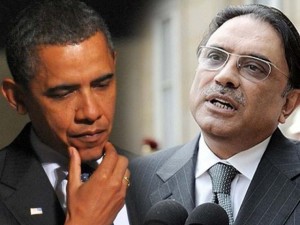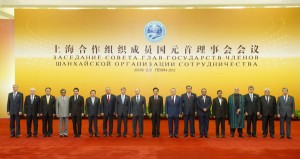Peace Watch » Editor's Take » Looking at 2014 From Kashmir Perspective
Looking at 2014 From Kashmir Perspective
It is not going to be same. TIt is not going to be same. Two crucial years are ahead, not for Kashmir only but for the entire Southwest Asian region. True, Washington and its NATO allies have envisioned their future in the region after 2014, but it would be too early to predict with absolute authority about the shape of thing to come. Ostensibly, the emerging scenario holds less of promise and more of peril.
There are more of questions than answers about the climax. One of the important questions that have been bothering experts in the region is that if South Asia was not once again slipping into the cold war and New Delhi was not becoming its front- ranked ally of US in the region. This South Asian concern is not shared by scholars and experts in the West but what they seem concerned about is, “whether America’s hour of power had passed”. Some are ‘lamenting’ if world without global policeman would ‘be volatile and ungovernable. And if the international institution would lose their capacity to solve the pressing international problems. ‘The America is a declining influence in the world’ is the buzzword with many important American scholars. ‘Many books have hit the stands about fading Western primacy and emerging multi-polar and pluralistic world. A Pakistani analyst Dr. Maleeha Lodhi in her recent article “ A Leaderless World” published in the News, has rightly put it:
“What is welcome is the call in these books for the US to adopt a more realistic global role consistent with its reduced leverage and diminished power, learn to work with others, and adapt both its policy and narrative to a world with many centers of power and political values different from its own.”
 The geopolitical realignments in Southwest Asia will sharpen as the US and NATO troops prepare to depart from Afghanistan. The meeting between US Secretary of State Hillary Clinton and Indian Foreign Minister S.M. Krishna in Washington on Wednesday (13-6-2012) was indicative that United States as against its old ally Pakistan in the region was looking upon India as its most important ally in the region. The United States removed ‘long source of ‘disappointment’ and dispelled doubts over relations of the two countries by signing a nuclear power deal. This deal further strengthened bonds of strategic partnership between the two countries. In 2008 former, President George W Bush had recognized ‘India’s global stature by giving it access to civilian nuclear technology. Hillary Clinton described the deal as “landmark.” New Delhi and Washington according to a Western news agency AFP are pursuing ‘a common cause on security issues in Afghanistan. “India is one of the most enthusiastic supporters of US-led efforts in Afghanistan as extremists consider New Delhi a top target.”
The geopolitical realignments in Southwest Asia will sharpen as the US and NATO troops prepare to depart from Afghanistan. The meeting between US Secretary of State Hillary Clinton and Indian Foreign Minister S.M. Krishna in Washington on Wednesday (13-6-2012) was indicative that United States as against its old ally Pakistan in the region was looking upon India as its most important ally in the region. The United States removed ‘long source of ‘disappointment’ and dispelled doubts over relations of the two countries by signing a nuclear power deal. This deal further strengthened bonds of strategic partnership between the two countries. In 2008 former, President George W Bush had recognized ‘India’s global stature by giving it access to civilian nuclear technology. Hillary Clinton described the deal as “landmark.” New Delhi and Washington according to a Western news agency AFP are pursuing ‘a common cause on security issues in Afghanistan. “India is one of the most enthusiastic supporters of US-led efforts in Afghanistan as extremists consider New Delhi a top target.”
The United States in its relation with India is going an extra-mile, subject specialists believe that it cannot be without an agenda. Antatol Lieven in his book Pakistan A Hard Country observes, “ We should not also dream- as US neo-conservative are apt-to do – that India can somehow be used by the US to control Pakistani behavior. The truth, as outlined by Ambassador Patterson, is exactly the opposite. Only Pakistanis can control Pakistan.” (page481). Emphasizing importance of Pakistan the author writes, “A new approach to Pakistani over future of Afghanistan should therefore be part of much deeper long-term engagement with Pakistan the West in general, and one tied not to the temporary war in Afghanistan but to the permanent importance of Pakistan as a state.”
Another question that has been engaging the attention of experts on Southwest Asia is that if New Delhi is not aligning itself with Washington to the disadvantage of its relations with its neighbors. Hilary Clinton welcomed India’s reduction of oil purchase from Iran. And exempted India from US sanctions on countries that maintain good relations and trade with Iran despite Israeli and Western concerns over its nuclear program.’
Alex Vatanka, a Middle East Institute Scholars believes that United States may shortly be caught in catch22 situation on its Iran question in Afghanistan. He sees China, Russia and Iran entering into a partnership for converting the Afghanistan to their advantage. In an op-ed article that first appeared in Frontline’s “Tehran Bureau” on
June 11, 2012 and was circulated by the Middle East Institute, he wrote:
“Most notably, the Shanghai Cooperation Organization (SCO) — dubbed as NATO of the East — has recently been holding itself out as an alternative mechanism to fill the vacuum once Western troops depart from Afghanistan. At the June 6-7 SCO summit in Beijing, China successfully drew Afghanistan further into its orbit. Kabul was granted observer status and Turkey was accepted as a dialogue partner in the Eurasian collective security body. Russia and China are the undisputed leaders in the six-state SCO and Iran has an observer state since 2005.”
In the building scenario the author believes that policy makers in US will be forced to reassure their goals in Afghanistan and policy objective of excluding Tehran. ‘At the same time, the Afghan authorities are also clearly contemplating the country’s long-term needs, and whether they will heed U.S. pressures remains unknown.’
The emerging scenario by all stretch imagination does not hold a promise for enduring peace in the region. But, largely suggests the region entering into yet another phase of neo-cold war. If history of the cold war in the region is guide, Kashmir cannot escape its impact.
In the building scenario, the regional players will have more a role in resolution of conflict in the region than the Western powers. Kashmir leaders are conscious about the emerging scenario in the region. Some have also written analytical pieces in the newspapers.
In the building scenario, most disturbing aspect is the damp home turf- with dissension deepening in an important organization threatening its very existence.
There are more of questions than answers about the climax. One of the important questions that have been bothering experts in the region is that if South Asia was not once again slipping into the cold war and New Delhi was not becoming its front- ranked ally of US in the region. This South Asian concern is not shared by scholars and experts in the West but what they seem concerned about is, “whether America’s hour of power had passed”. Some are ‘lamenting’ if world without global policeman would ‘be volatile and ungovernable. And if the international institution would lose their capacity to solve the pressing international problems. ‘The America is a declining influence in the world’ is the buzzword with many important American scholars. ‘Many books have hit the stands about fading Western primacy and emerging multi-polar and pluralistic world. A Pakistani analyst Dr. Maleeha Lodhi in her recent article “ A Leaderless World” published in the News, has rightly put it:
“What is welcome is the call in these books for the US to adopt a more realistic global role consistent with its reduced leverage and diminished power, learn to work with others, and adapt both its policy and narrative to a world with many centers of power and political values different from its own.”
The geopolitical realignments in Southwest Asia will sharpen as the US and NATO troops prepare to depart from Afghanistan. The meeting between US Secretary of State Hillary Clinton and Indian Foreign Minister S.M. Krishna in Washington on Wednesday (13-6-2012) was indicative that United States as against its old ally Pakistan in the region was looking upon India as its most important ally in the region. The United States removed ‘long source of ‘disappointment’ and dispelled doubts over relations of the two countries by signing a nuclear power deal. This deal further strengthened bonds of strategic partnership between the two countries. In 2008 former, President George W Bush had recognized ‘India’s global stature by giving it access to civilian nuclear technology. Hillary Clinton described the deal as “landmark.” New Delhi and Washington according to a Western news agency AFP are pursuing ‘a common cause on security issues in Afghanistan. “India is one of the most enthusiastic supporters of US-led efforts in Afghanistan as extremists consider New Delhi a top target.”
The United States in its relation with India is going an extra-mile, subject specialists believe that it cannot be without an agenda. Antatol Lieven in his book Pakistan A Hard Country observes, “ We should not also dream- as US neo-conservative are apt-to do – that India can somehow be used by the US to control Pakistani behavior. The truth, as outlined by Ambassador Patterson, is exactly the opposite. Only Pakistanis can control Pakistan.” (page481). Emphasizing importance of Pakistan the author writes, “A new approach to Pakistani over future of Afghanistan should therefore be part of much deeper long-term engagement with Pakistan the West in general, and one tied not to the temporary war in Afghanistan but to the permanent importance of Pakistan as a state.”
Another question that has been engaging the attention of experts on Southwest Asia is that if New Delhi is not aligning itself with Washington to the disadvantage of its relations with its neighbors. Hilary Clinton welcomed India’s reduction of oil purchase from Iran. And exempted India from US sanctions on countries that maintain good relations and trade with Iran despite Israeli and Western concerns over its nuclear program.’
Alex Vatanka, a Middle East Institute Scholars believes that United States may shortly be caught in catch22 situation on its Iran question in Afghanistan. He sees China, Russia and Iran entering into a partnership for converting the Afghanistan to their advantage. In an op-ed article that first appeared in Frontline’s “Tehran Bureau” on
June 11, 2012 and was circulated by the Middle East Institute, he wrote:
“Most notably, the Shanghai Cooperation Organization (SCO) — dubbed as NATO of the East — has recently been holding itself out as an alternative mechanism to fill the vacuum once Western troops depart from Afghanistan. At the June 6-7 SCO summit in Beijing, China successfully drew Afghanistan further into its orbit. Kabul was granted observer status and Turkey was accepted as a dialogue partner in the Eurasian collective security body. Russia and China are the undisputed leaders in the six-state SCO and Iran has an observer state since 2005.”
In the building scenario the author believes that policy makers in US will be forced to reassure their goals in Afghanistan and policy objective of excluding Tehran. ‘At the same time, the Afghan authorities are also clearly contemplating the country’s long-term needs, and whether they will heed U.S. pressures remains unknown.’
The emerging scenario by all stretch imagination does not hold a promise for enduring peace in the region. But, largely suggests the region entering into yet another phase of neo-cold war. If history of the cold war in the region is guide, Kashmir cannot escape its impact.
In the building scenario, the regional players will have more a role in resolution of conflict in the region than the Western powers. Kashmir leaders are conscious about the emerging scenario in the region. Some have also written analytical pieces in the newspapers.
In the building scenario, most disturbing aspect is the damp home turf- with dissension deepening in an important organization threatening its very existence.
Filed under: Editor's Take · Tags: Indo-Pak, Kashmir, peacewatch, Z.G. Muhmmad







